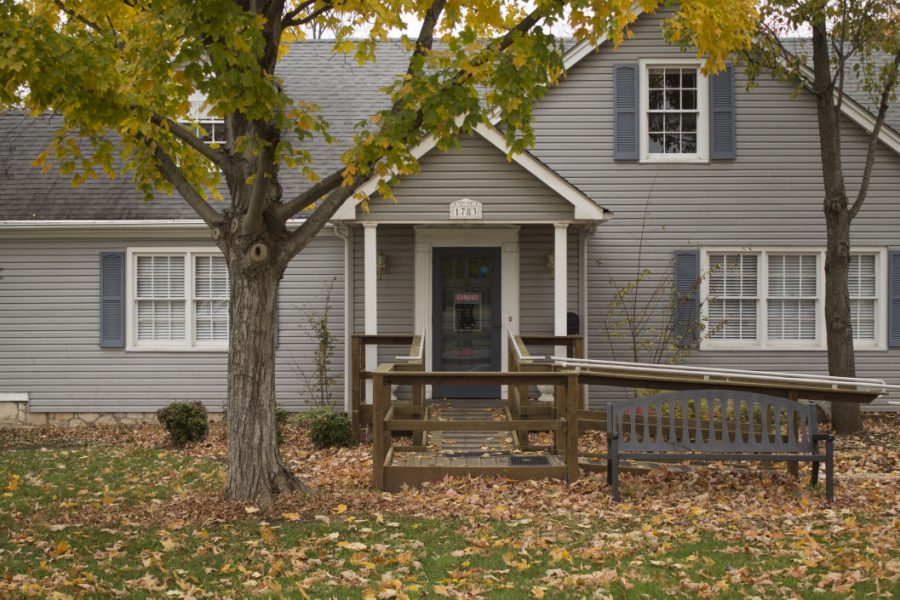Black History Month event recalls historic Bowling Green communities
February 9, 2018
A photo of WKU’s first African-American prom queen and two poster board displays, one displaying overhead shots of WKU’s campus in the 1960s versus the 2010s and the other displaying the names of various citizens who owned land and lived where WKU’s football stadium now stands, called attention to Bowling Green’s black history.
In honor of Black History Month, the Bob Kirby Branch Library in Bowling Green hosted a public presentation about Bowling Green’s history of African-American communities yesterday evening.
The presentation featured various items donated to the African American History Museum and a discussion led by museum volunteer Don Offutt, 70, who lives in Lexington, but travels to the museum at least twice a week to open and operate it.
Offutt was born in Shake Rag, a historic black community that once thrived in Bowling Green, in his grandmother’s home, due to a lack of nearby desegregated hospitals that existed at the time.
Offutt later went on to help found the Omega Psi Phi fraternity at WKU in 1968, the first black fraternity on WKU’s campus, and has volunteered at the museum for years.
“I do it because I know how to turn the plight of our people around,” Offutt said. “In a sense, this is my religion.”
Along with Shake Rag, there was Jonesville, an African-American community founded in 1867 by an emancipated slave and home to various businesses, churches, a school and several hundred residents.
Jonesville, along with a few other predominantly black communities that once thrived in Bowling Green, such as Shake Rag and an area named Delafield, have seemingly been forgotten amidst numerous expansions to WKU and other Bowling Green areas.
Aside from a number of Bowling Green residents who were born in these historic communities, the African American Museum, located on Chestnut Street near the roundabout, contains some of the areas’ last relics and stories.
Ron Whitlock, 63, a pastor at New Beginnings Christian Ministries in Bowling Green, grew up in the Delafield area, the only black community that experienced any integration with whites.
“You can’t allow someone else to tell your story,” Whitlock said, speaking on behalf of the importance of the African American Museum. “It’s important because African American history has been left out of the mainstream history.”
John Potter, 70, was born in Indianapolis but moved to Bowling Green in 1966 and attended WKU as a freshman. Potter is also a founding member of the Omega Psi Phi fraternity at WKU and has known Offutt since the 1960s
Potter served as a Marine in the Vietnam War and a policeman in Washington D.C., but came back to Bowling Green over 30 years ago and has stayed since.
“I love Bowling Green,” Potter said. “I couldn’t wait to get back.”
Potter said he believes Bowling Green is not typically thought of as a historical town, though he said he believes the opposite is true.
“A lot of the young folks need to know about the history [of Bowling Green],” Potter said. “There’s a lot of history right here.”
Deborah Claypool, 61, born in Shake Rag, works as office manager at the WBKO television station in Bowling Green and has served on the museum’s Board for the past eight years.
Claypool said she hopes more people can come to the museum and learn about Bowling Green’s past.
“It wasn’t just a black community,” Claypool said, referencing Shake Rag specifically. “Everything was there.”
In speaking about the many photos and items kept inside the museum, Claypool said they are intended for Bowling Green’s future.
“We want to keep them [the items] for future generations,” Claypool said. “We’re hoping the history will continue.”
Rachel Ferguson, 29, who works as Adult Programming Coordinator at the four county libraries located within Bowling Green, including Bob Kirby Branch, coordinated the presentation in hopes of casting light on Bowling Green’s diverse history.
“We’re really wanting to push local history,” Ferguson said while commenting on the libraries’ current focus. “Our history is important, and knowing where we came from and where we’re going is important.”
Offutt ended his presentation by emphasizing that Shake Rag and other black communities in Bowling Green were not simply music hubs, as commonly depicted, but areas that developed proud, intelligent and capable individuals.
“We built schools. We were veterans,” Offutt said. “We were families, we were businesses, we were a community.”
Reporter Griffin Fletcher can be reached at 270-745-2655 and [email protected].













